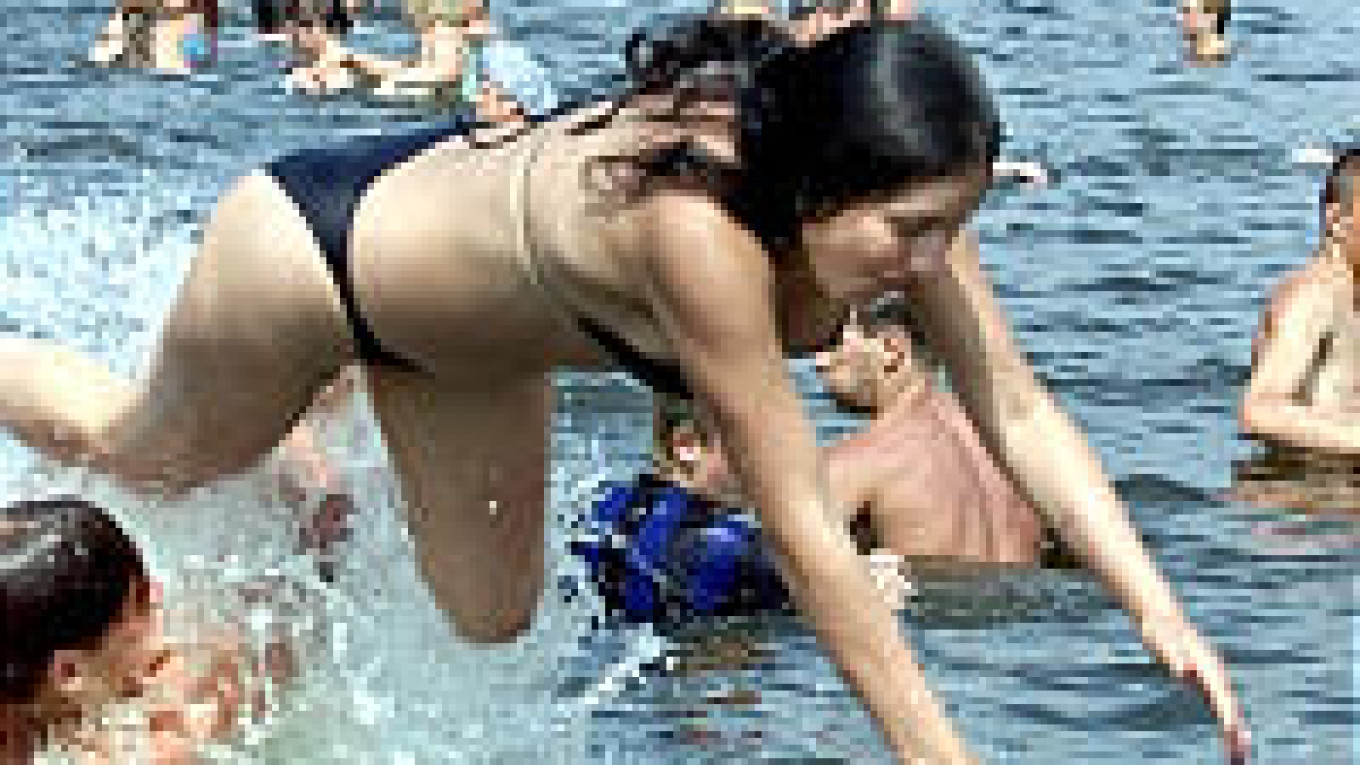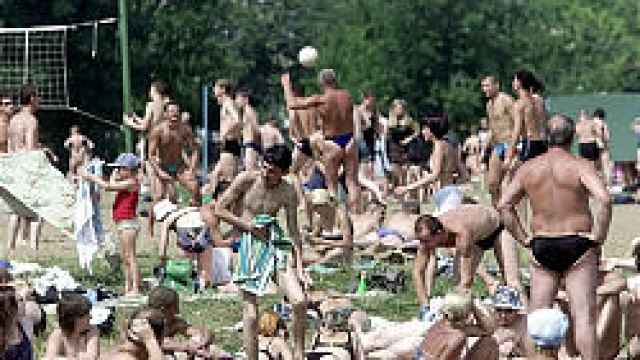Of course, Moscow's beaches bear less than a fleeting resemblance to those of Honolulu or Cyprus, but they do allow local residents to sun and swim without setting foot on an airplane. And, happily, the city's health inspection service is currently at work inspecting local bathing holes and beaches. Those that pass inspection are given the green light to welcome swimmers, but each beach must undergo extensive scrutiny before it is approved for swimming. The process involves not only testing the water for chemical and bacterial content, but also using professional divers to check for hazardous wastes that may have been deposited underwater during the winter months.
So far this year, nine beaches have been officially approved for swimming. These include Beloye Ozero in Kosino in eastern Moscow; the Rublyovskoye Vodokhranilishche; the beaches at the Meshchyorskoye suburb west of Moscow; the Chyornoye Ozero, Shkolny Prud and Bolshoi Gorodskoi Prud in Zelenograd; the Dynamo beach and Akademicheskiye Prudy in northern Moscow; and the Troparyovo recreation area in southwestern Moscow.
Furthermore, the capital's most popular recreation area, Serebryany Bor, is soon to receive its official certification to allow swimming. Workers there are currently busy adding finishing touches to the facilities at the northern Moscow park.
"I'm sure Serebryany Bor will pass all the requirements," Nikolai Filatov, the head doctor at the city's health inspection service, said Wednesday.
Which means that visitors to Serebryany Bor will be met with more than clean water this summer. If passing City Hall's requirements ensures that a lake or river's water is relatively unpolluted, it also suggests that visitors are likely to find clean sand, drinking fountains and a set of additional features like cafeterias, toilets, changing rooms, children's entertainment, medical and emergency services and increased vigilance on the part of city police officers and private guards.
Additionally, the sale of hard liquor is prohibited at officially certified beaches, not surprising in light of the fact that nearly 100 percent of all local drownings involve people swimming or boating while under the influence of alcohol.
|
| Igor Tabakov / MT |
"If you want to drink, it's best to stay onshore," he added.
Serebryany Bor also offers visitors a certain number of perks that less popular beaches do not. While its Beach No. 1, for example, is almost totally wild, its grass unmowed and trees untrimmed, Beach No. 2 boasts all the facilities of a proper resort beach, including changing rooms, refreshment stands and a playground. Some park beaches also offer row boats and water bicycles for hourly rental. And for beachcombers who want to spice up their day in the sun with a bit more skin than convention normally allows, there's Beach No. 3 -- a popular hangout for local nudists.
Official hours for certified city beaches are 9 a.m. to 10 p.m., during which time lifeguards are on duty. But many people linger long after closing time, especially since during June darkness doesn't fall until after 11 p.m. Swimming after closing time, however, is not recommended, since the chances for rescue of a swimmer in trouble are minimal. More than 300 people drowned in Moscow last year, most of them at beaches where no lifeguard was on duty.
But swimming at locations not approved by City Hall can pose a slew of health hazards in addition to drowning, Filatov said. Some water, for example, that may appear to be clean may actually contain partially-treated sewage, which can contain cholera and hepatitis bacteria.
"Sadly, it always appears that some swimmers couldn't care less about the consequences of their actions," Filatov said, adding that sometimes people deliberately ignore "No Swimming" signs posted at beaches.
Another problem swimmers who brave noncertified waters risk is bather's itch, or zud kupalshchika, a parasitic infection spread by ducks and other water birds. Although possessing of a fairly simple pharmaceutical cure, the condition -- caused by tiny parasites that drill through the skin, and easily contracted when swimmers come in contact with water plants, birds or sand -- is, Filatov said, nightmarish while it lasts.
"The itch is terrible," he said. "It causes terrible discomfort and causes the sufferer to scratch until bloody lesions appear. It's not the kind of health problem one can [treat at home]. Seeking professional assistance is inevitable."
Filatov further warned that swimmers who accidentally swallow water while bathing, even on certified beaches, risk contracting an unpleasant intestinal infection that is treatable with antibiotics.
Despite all the warnings, however, swimmers who avoid ducks, alcohol and "No Swimming" signs benefit from every likelihood of enjoying a pleasant day at the beach. But local residents still squirming in their swimming trunks at the thought of Moscow's treacherous waterfront might do well to keep in mind that the Moscow River may have burrowing parasites, but, unlike Hawaii and Cyprus at least it's shark- and barracuda-free. So far.
Serebryany Bor: Take trolleybus 20 from metro Okhotny Ryad, trolleybus 20, 21 or 65 from metro Polezhayevskaya or trolleybus 65 from metro Sokol. Note: These beaches have yet to be declared safe by city authorities.
Beloye Ozero: Take a minivan taxi from metro Vykhino.
Rublyovskoye Vodokhranilishche: Take bus 127 or 129 from metro Molodyozhnaya.
Chyornoye Ozero, Shkolny or Bolshoi Gorodskoi Prud: Take bus 400 from metro Rechnoi Vokzal.
Dynamo beach and Akademicheskiye Prudy: Take a minivan taxi from metro Voikovskaya or Petrovsko-Razumovskaya.
A Message from The Moscow Times:
Dear readers,
We are facing unprecedented challenges. Russia's Prosecutor General's Office has designated The Moscow Times as an "undesirable" organization, criminalizing our work and putting our staff at risk of prosecution. This follows our earlier unjust labeling as a "foreign agent."
These actions are direct attempts to silence independent journalism in Russia. The authorities claim our work "discredits the decisions of the Russian leadership." We see things differently: we strive to provide accurate, unbiased reporting on Russia.
We, the journalists of The Moscow Times, refuse to be silenced. But to continue our work, we need your help.
Your support, no matter how small, makes a world of difference. If you can, please support us monthly starting from just $2. It's quick to set up, and every contribution makes a significant impact.
By supporting The Moscow Times, you're defending open, independent journalism in the face of repression. Thank you for standing with us.
Remind me later.



